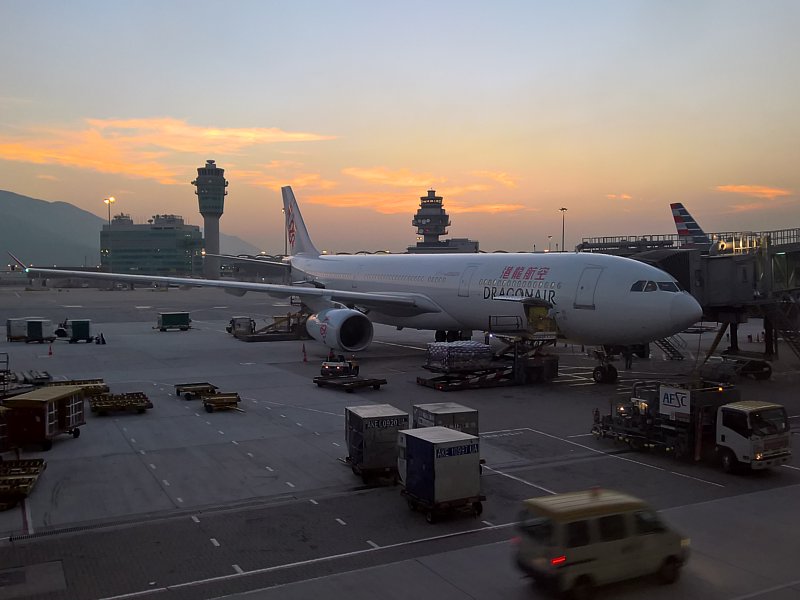
Luxtraveller.com takes an exclusive look at the new Cathay Dragon service, which is the newly branded service of the Cathay Pacific regional airline Dragonair, with a trip report on Cathay Dragon from Shanghai to Hong Kong.
Dragonair has now been recently re-branded by its parent company, Cathay Pacific, and is now called "Cathay Dragon." With many elements taken from the mainline service, we wanted to try the new Cathay Dragon, and see how it compares to its more upmarket cousin.
What was previously known as Dragonair (operating as Hong Kong Dragon Airlines) and now called Cathay Dragon is a Hong Kong-based international 'regional airline'. It's often called Cathay Pacific's low cost carrier, but it's more than that. It operates a large fleet to over 44 destinations across Asia, but mainly mainland China.
It is now a Cathay Pacific subsidiary and oneworld affiliate. There is a new Cathay Dragon livery, which includes the iconic Cathay 'brushwing' logo, but also with the older Dragon logo on the side of the cockpit.
As such, we at lux-traveller wanted to test out the new Cathay Dragon identity from check-in to seats and lounges. Does it, we wanted to know, still have the reputation as the cheaper Cathay service without all the frills.
Shanghai to Hong Kong has long been the core Dragonair route, and as such sees planes in both Dragon and Cathay liveries ply the route, with a ticket on the real Cathay metal about 10% more expensive than on its Dragon Cousin.
Both airlines fly the route, but only a few of the Cathay Dragon services use an A330, so it pays to pick carefully, otherwise you'll be in a narrow body and not have a lot of room for the three hour trip.
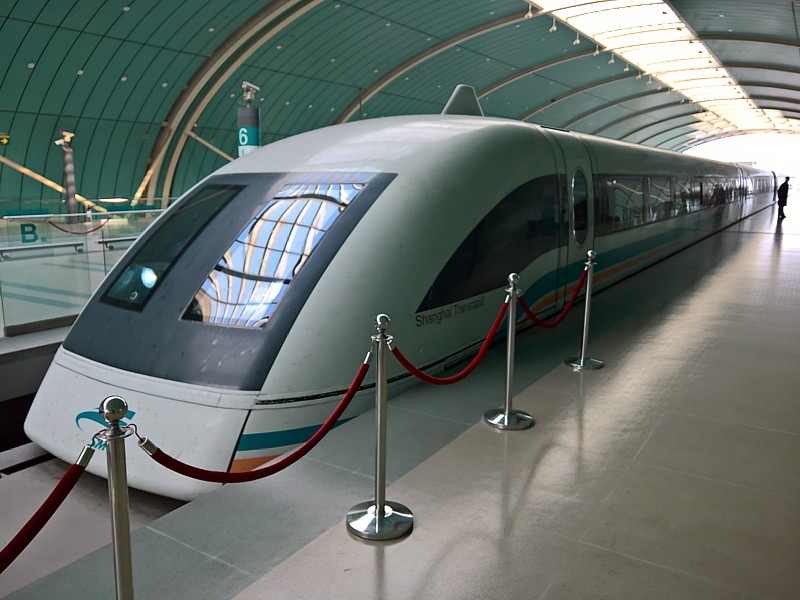
Shanghai Maglev airport train
Firstly, we had to get transport to Shanghai Airport.
I had tried to check in online, but the new Cathay Dragon website still will not allow this, and so I took a slightly earlier cab from central Shanghai to the airport train station. Alas, the cab driver saw I was a westerner and tried for charge me 200RNB for a 30RNB trip, before backing down.
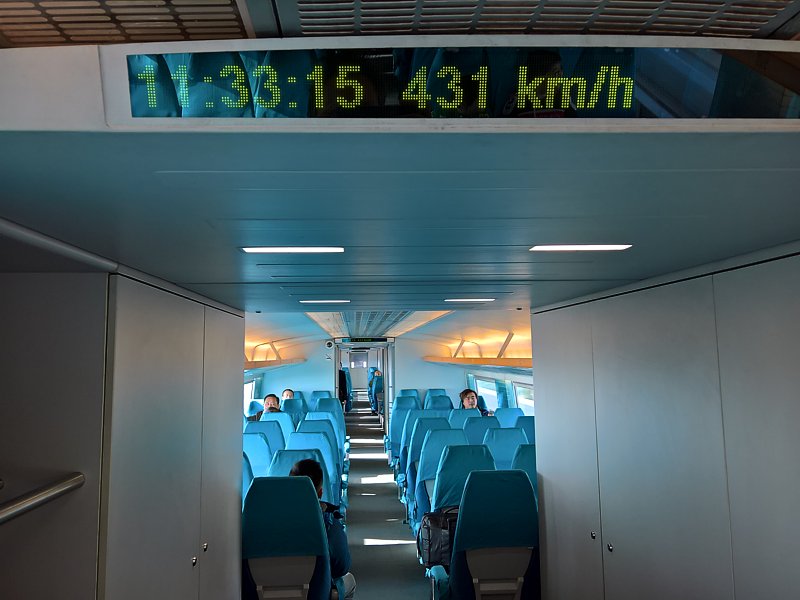
The Maglev is a wonderful airport train, the only magnetic levitation train in the world, which takes just 10 minutes to get to Pudong at 430km/h. Alas the Maglev station is slightly less impressive Longyang Road station, which still looks unfinished, and the track appears to stop in mid-air when construction of the rest of the line to the city centre was abandoned.
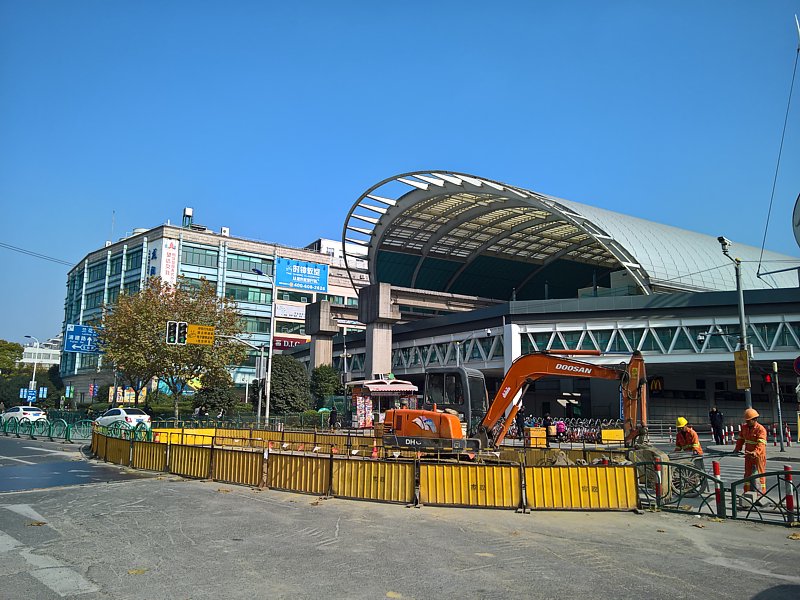
At Pudong Dragonair check in was fast using the automated ticket machine, which offered just two buttons - Cathay Dragon, or Cathay Pacific. This later proved to be a mistake. Only if you check in at the desk do you get a vital fast track immigration card.
Immigration can only be described as a zoo, and security was even worse, with queues of over an hour. Later I found that an elite oneworld card will give you a fast track slips for security, but that same fast track won't recognise oneworld cards if you don't pick up one at check in.
After getting through security, a drink in the lounge was in order. Cathay Dragon use the same Cathay Pacific as it's more upmarket counterpart, and it's a good newly designed lounge. Our Cathay Dragon boarding card with a British Airways Gold Card was accepted without question despite being seated in economy.
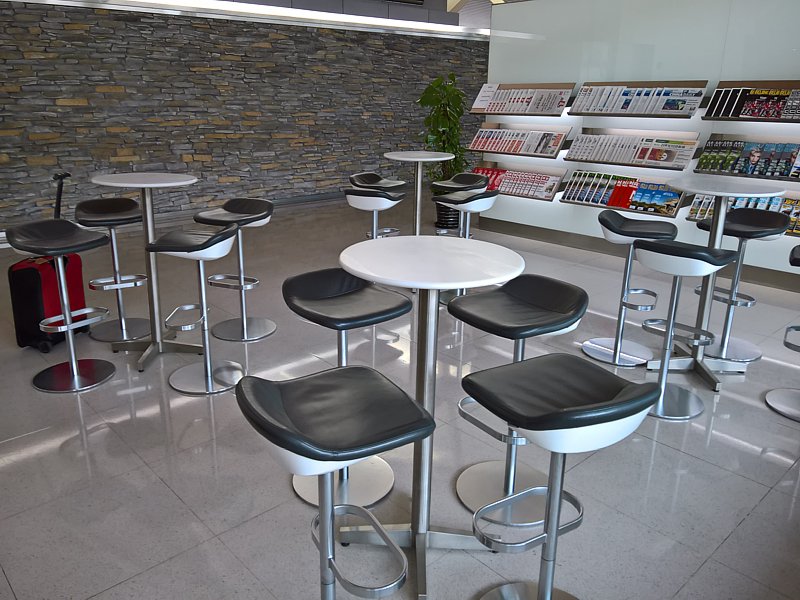
Cathay Pacific Shanghai Lounge
The Cathay Dragon lounge at Shanghai is the classic 'on a balcony within the airport' design, up the small escalator on the extreme left of the terminal. It's basically one large room, with a smaller arm leading to it. However it does offer great views to see if your plane has started boarding.
The lounge itself looks nice and it is vast but was pretty empty, despite having an A330 on the route.
There are lots of comfy armchairs, with small lamps between them. Alas, and this is a common fault with Cathay lounges, the chairs are arranged in groups of 4 or 6, and with only a few single passengers, it was hard to find somewhere to sit that wasn't in with another group of one.
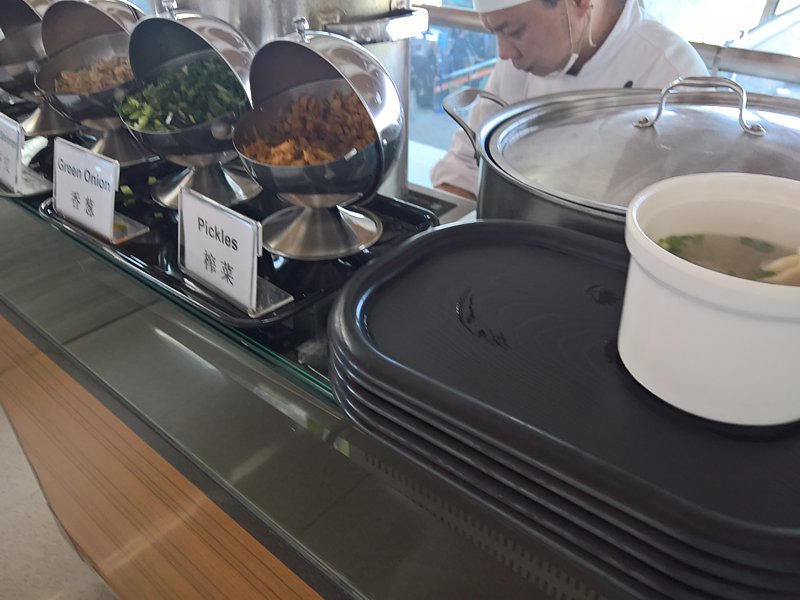
Thankfully there was a long metal bench onside the side of the balcony, and here most single passengers ended up sitting overlooking the view.
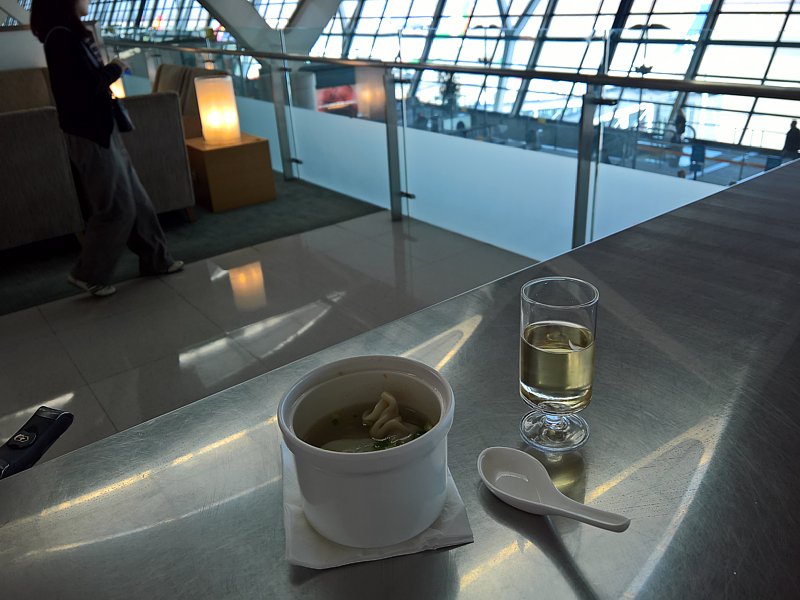
There isn't a noodle bar, unlike most Cathay lounges, but instead there is a cart which is wheeled out with a big tub of soup. The man pours a ladle out of his vast soup container over the pre-prepared noodles, and away you go. It does, but it is no Hong Kong.
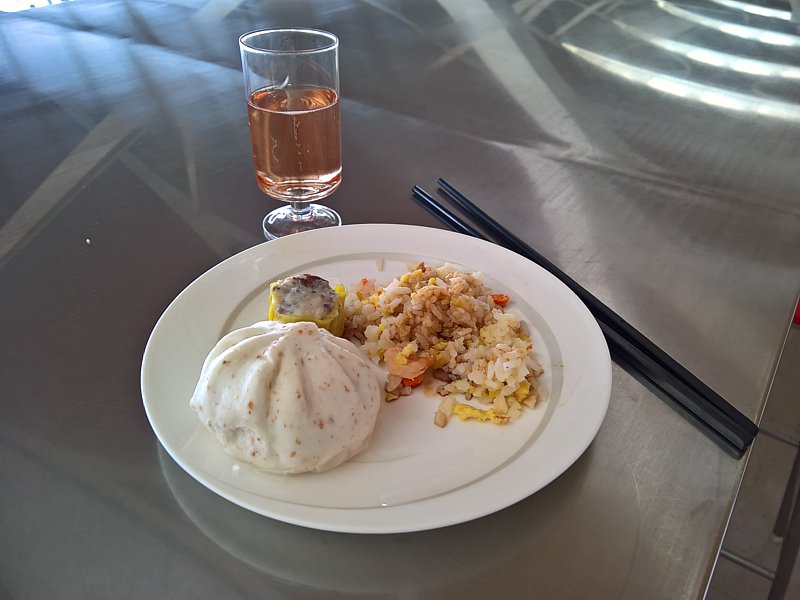
There are also packets of sandwiches, with egg, fish, or beef.
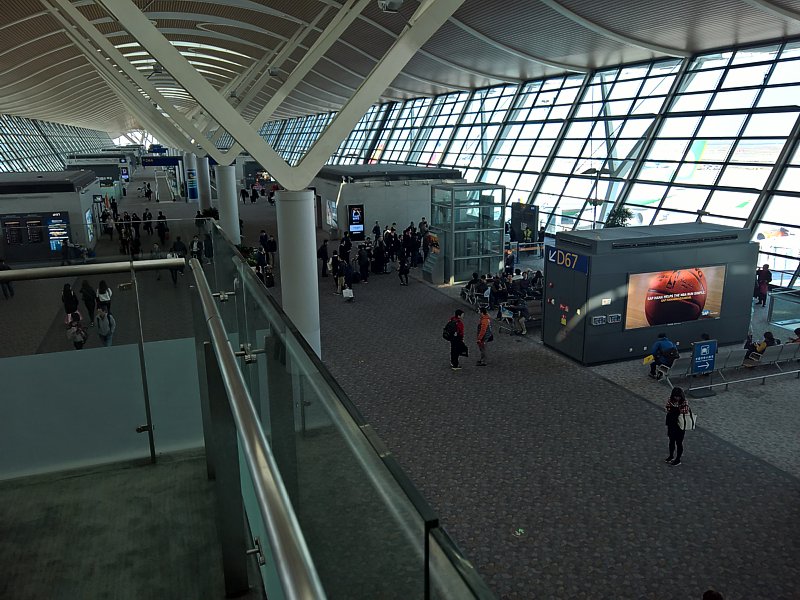
The bar is also pretty basic. In the fridge there are can of beer, while along the top of bar are five optics, with the usual Gin and Vodka. In a bucket on the worktop are two types of white and a sparkling Rose which was actually pretty good. There are two other Australian reds on the counter top too.
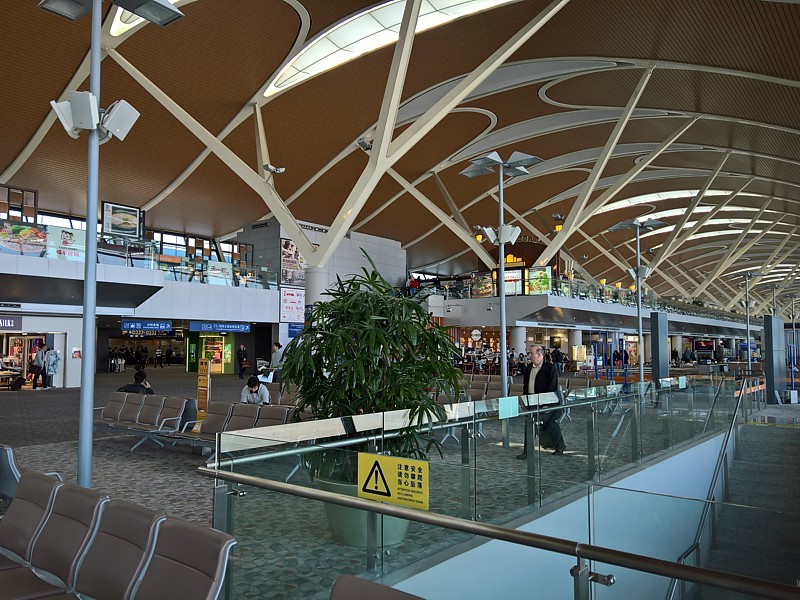
In short it is a classic, but not remarkable, Cathay Pacific lounge. Good enough for the short flight to Hong Kong, and boarding was already commencing. Again, Cathay Dragon had no problems with my BA Gold Card to give priority boarding. While walking along the jetway, there was an excellent view of the Etihad A330 in Manchester United livery, which I've already travelled on from Abu Dhabi.
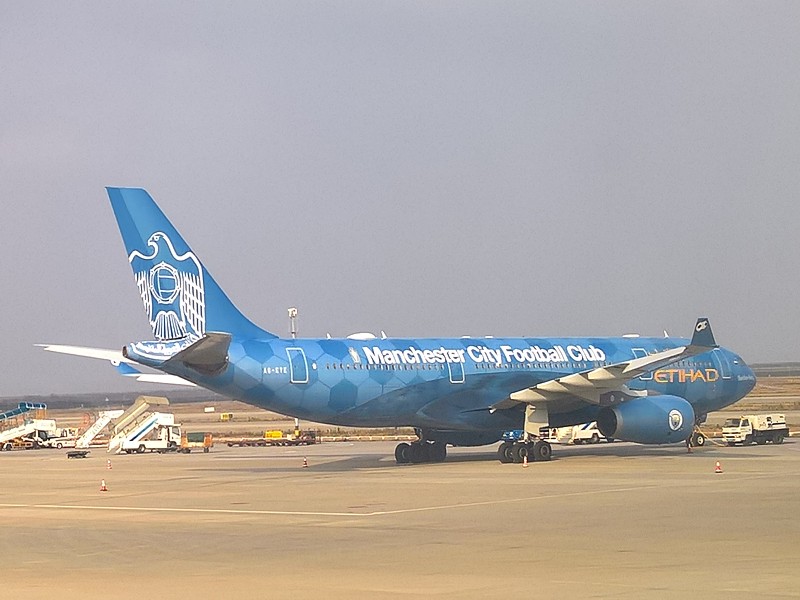
Take-off was heavily delayed. I know that delays at Shanghai are a cliche, thanks to the huge boom in Chinese air travel, but in this case the captain came on the PA and said it would be at least an hour before we got a take off slot.
Cathay Dragon A330 seating
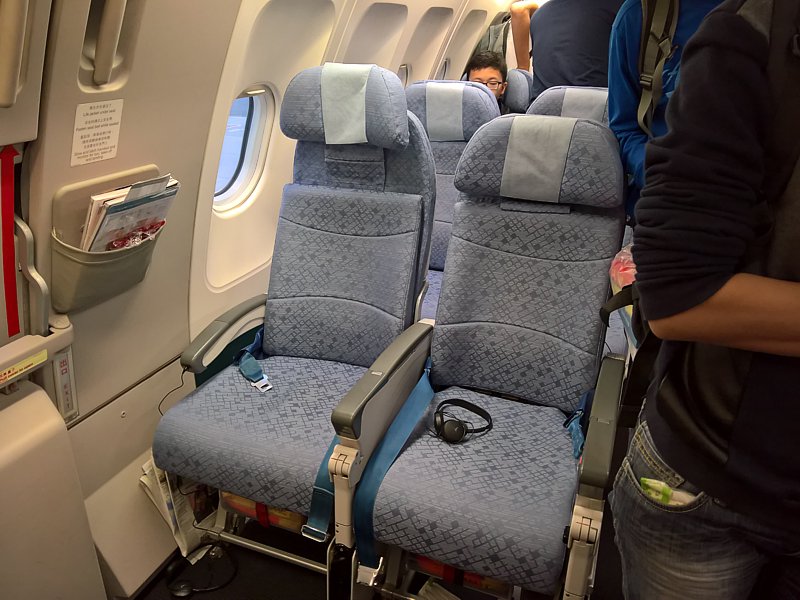
Dragonair operates 2 versions of the A330-300s, and this one was a 2-class configuration with just business and economy class seats. Some versions have First Class too.
I was in the front of the rear cabin at the emergency exit row 40, which as I found out was a bad choice for comfort and service. It's not that it's particularly horrible, indeed the legroom here is better than most and you can get up without problems, but it was right opposite the toilets and I soon found a group of about ten Chinese teenagers hanging around the space beside the door infront of me. Also the inflight entertainment screen is on an arm, which refused to stand up, and it was impossible to watch the screen without holding onto it. There was also no window, and as I later found the IFE audio didn't work, and that this row was the very last in the plane to be served inflight meals.
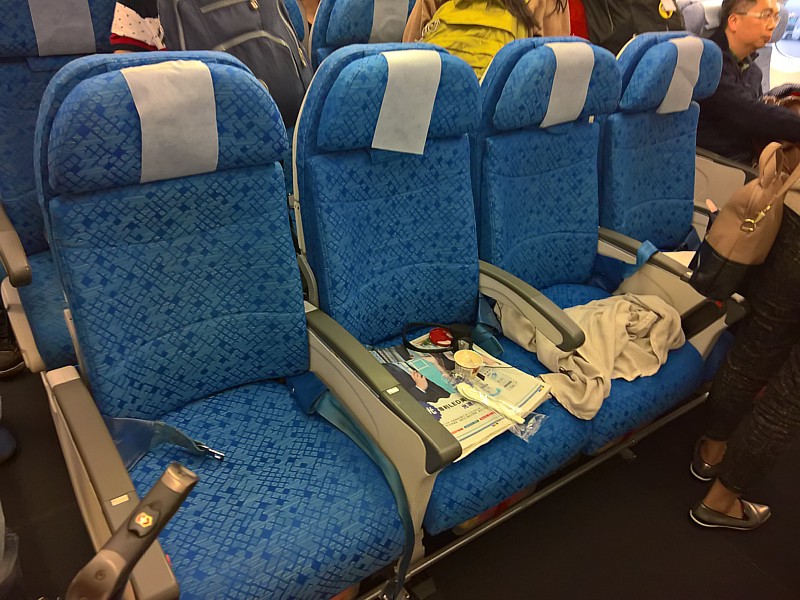
Much better for extra legroom are the centre bulkhead seats, which don't suffer from the toilet crowd hanging around in front of them.
Ahead of economy was the business class cabins with 42 seats in a 2-2-2 layout. These are the same regional recliner business class seats, which are almost identical to premium economy on Cathay Pacific premium routes. As we had a delay I asked if I could take a look, and found the Business cabin all but deserted. The Cathay Dragon Business Class seat, incidentally, is pretty much like Premium Economy on Cathay Pacific.
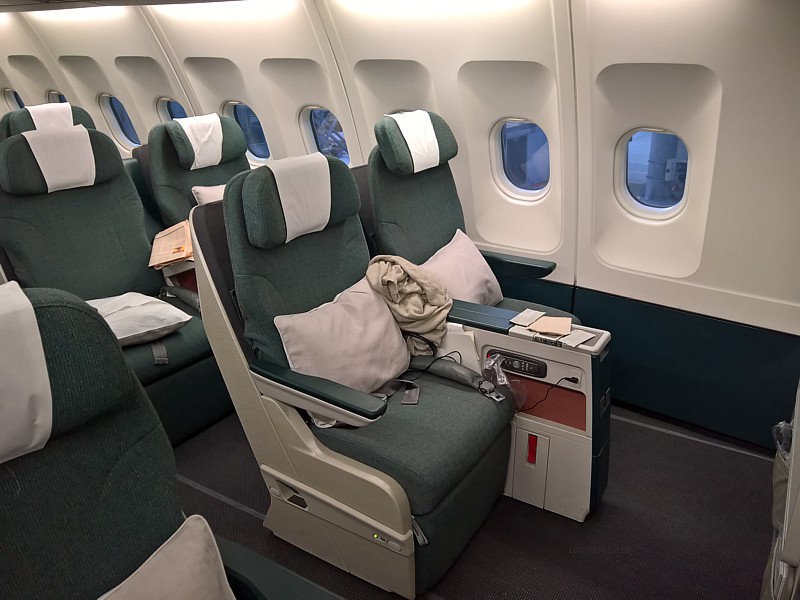
Indeed, as I later found out the Cathay Dragon First class seat is the Cathay Pacific Business class seat. To say there is branding confusion here is missing the point - it appears that Dragon offer one step down from what the mainline pacific is doing in most things.
Cathay Dragon inflight meals
That isn't the case with meals however. Cathay Dragon offer full hot meals in the middle of the afternoon, on a three hour flight. It wasn't too bad, with two choices on offer, and printed menus handed around before-hand. The options were steamed fish with rice, or pork and potato in a thyme and rosemary sauce.
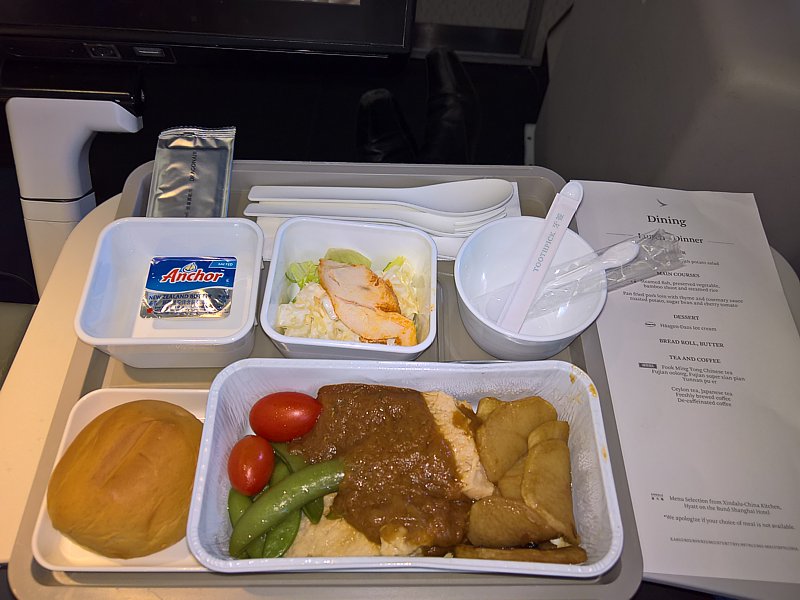
Alas, Cathay Dragon operate the same service as Cathay Pacific - service starts at the four corners of the cabin, and work their way in, so at row 40 I was the last to be served, and the other meal option had run out. Choice came down to one only, pork.
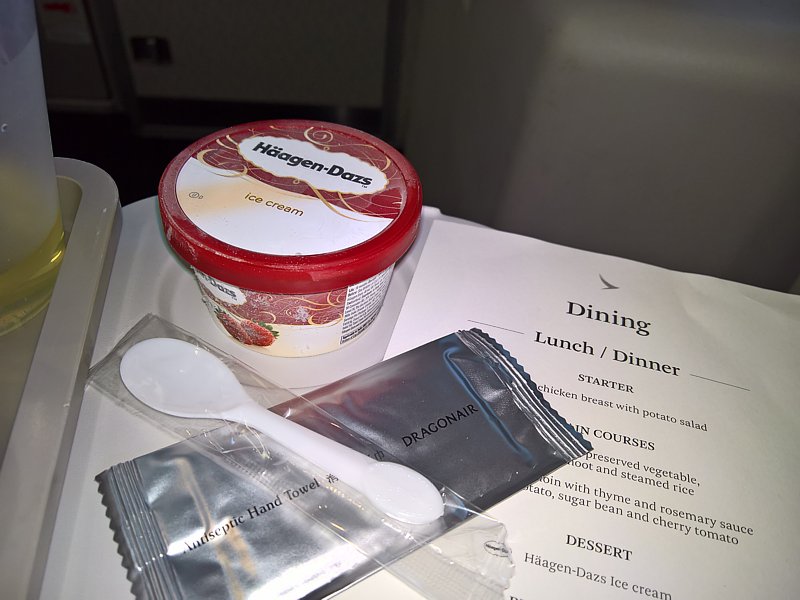
The chicken breast and potato salad for starters was delicious. The Pork, less so, but still with plenty of flavour.
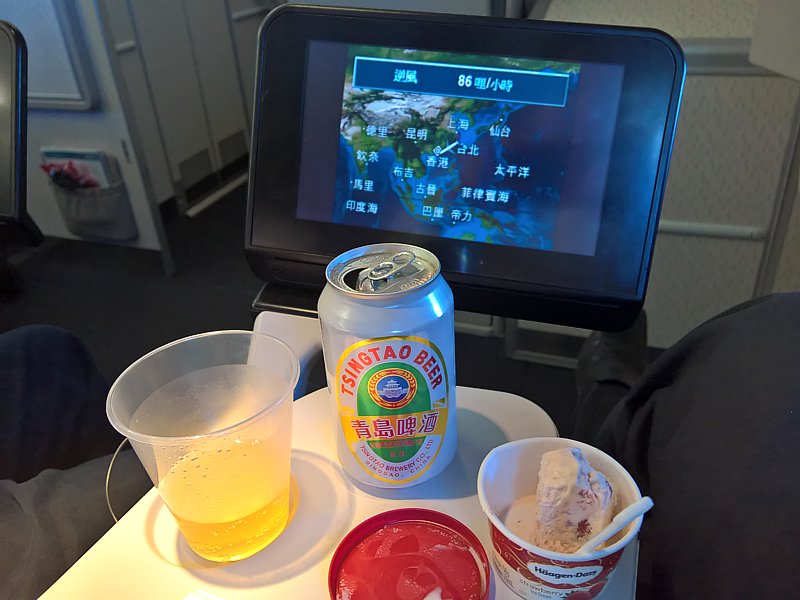
Later, Ice cream was offered. It was snap-frozen hard. After half an hour of heating up the deep-frozen ice-cream in the warmth of the cabin, the Haagen-Dazs strawberry flavour was edible.
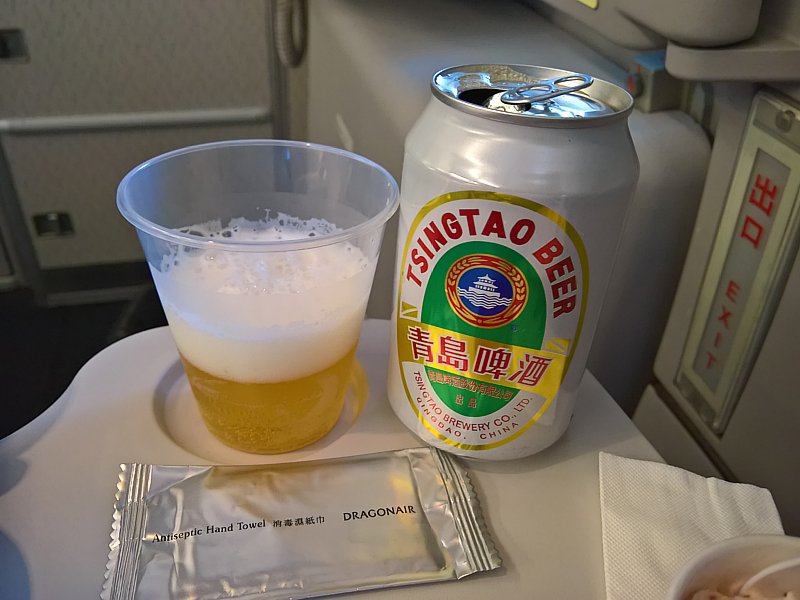
There was a full bar service, but the wine was by some Chinese vineyard I hadn't heard of, so I went for a can of the Tsingtao beer, which is like a European lager beer, but with a bite.
Cathay Dragon inflight entertainment system
Each seat in the Cathay Dragon A330 has full in-flight entertainment (IFE) system with AVOD (audio/visual on demand), which is one of the main reasons to pick the aircraft over the regular A320 flights, without a screen.
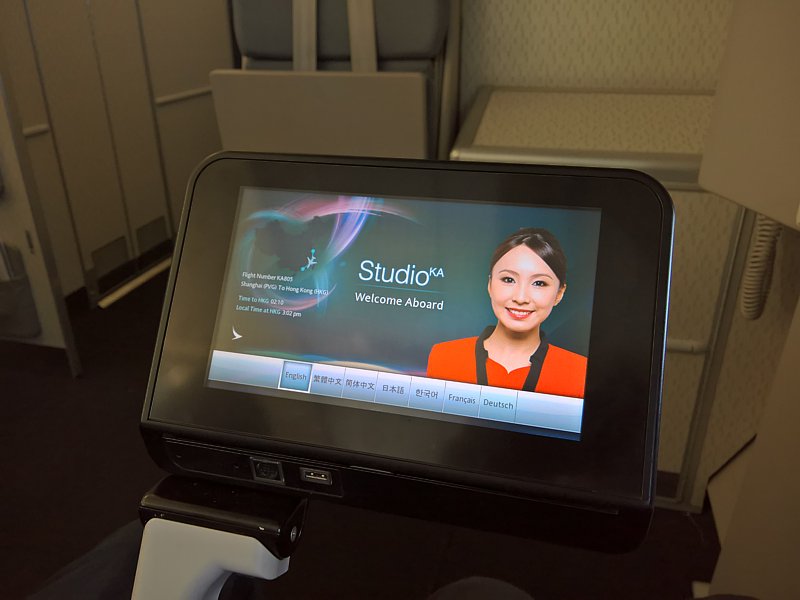
Similar to Cathay Pacific's Studio CX, Cathay Dragon's Studio KA offers an OK selection of films and TV shows, but again the selection seems to be cut back from the main Cathay offering. There were relatively few Western options.
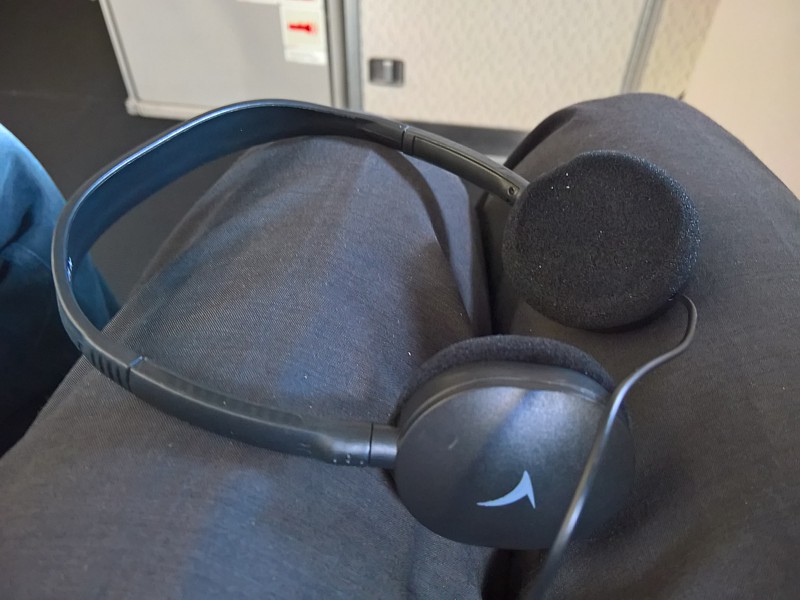
Alas my TV monitor was broken, and despite a reboot halfway through the flight, never worked properly. In particular, the sound was so faint as to be inaudible. I tried to watch a film with sub-titles, but that again kept of going from subtitle to non-subtitle mode. Maybe it was just me, but I was very unimpressed.
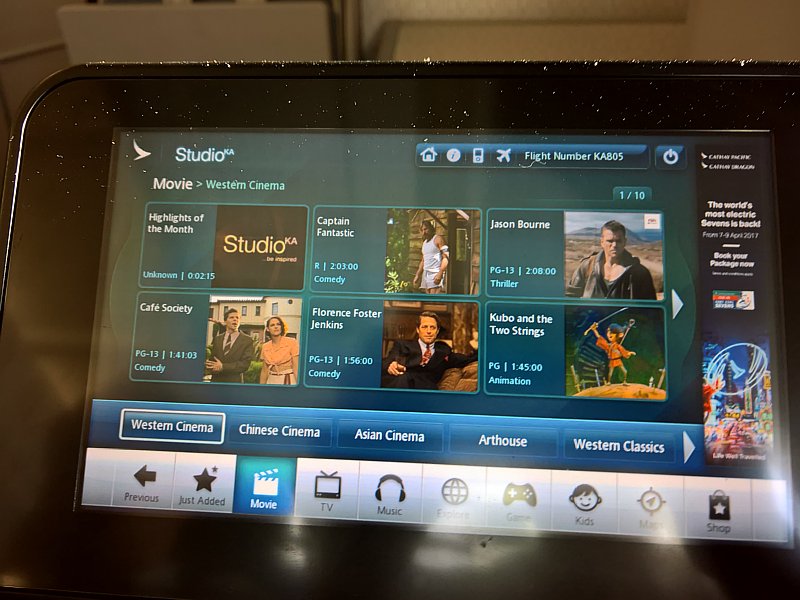
There is also Cathay Dragon's new inflight magazine. A decent read, the marketers have got to work on the content with long articles about how the Cathay Dragon logo is changing. If you want real content, there are only a couple of travel articles.
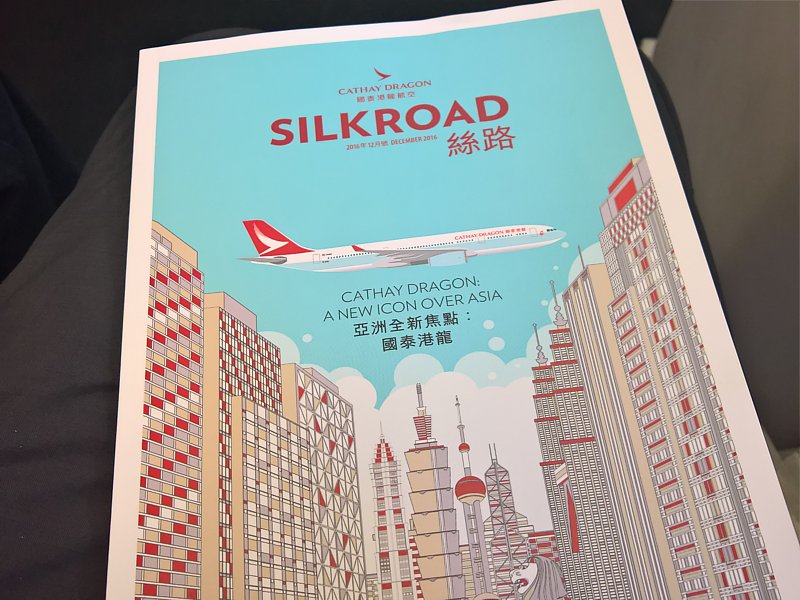
There is also no inflight wifi.
Cathay Dragon review
Overall, I had a really enjoyable experience on my first Cathay Dragon first class flight. The hard product was decent for a short intra-Asia fight, and the soft product puts many European carriers to shame, with decent tasting food. The flight attendant was friendly and attentive throughout the flight and appeared to care about providing great service, even to the stage of offering another can of Tsingtao. Alas, I guess I just chose the wrong seat.
If Cathay Dragon is the low cost offering of Cathay Pacific, it isn't too low cost.
Of course Dragonair was once an arch-rival of Cathay Pacific, which for decades has concentrated on flights between the UK and Australia. Ass such Cathay left the undeveloped mainland China market up to Dragonair. At the time they were seen as less-desirable routes, however with the resurgence of the middle Kingdom, they are now very much the market Cathay Pacific wants, and consequently in 2006 Cathay bought Dragon. Which is why we are seeing the merging of the brands now.
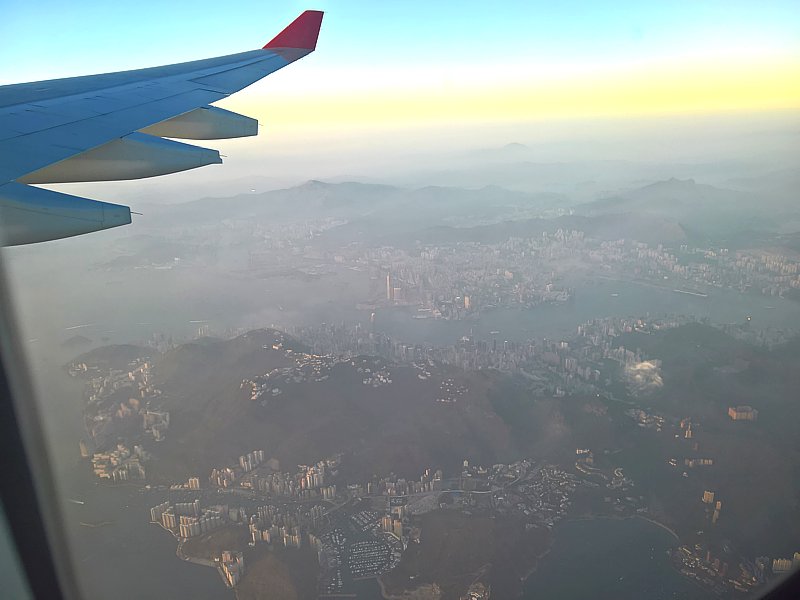
One last point. In the weeks since taking a flight, the miles never posted to the British Airways Executive Club. It could be a new Cathay Dragon thing, but it took several phones calls to the miles awarded, including one where the Executive Club refused to believe that flights with a KA code earn miles. It doesn't help that one part of BAEC website says that oneworld alliance partner airlines do not earn Tier Points, but the Specific Cathay Pacific page does say you earn full miles and Tier Points on Dragonair, but not Cathay Dragon.
Lux-traveller paid its own way for this Trip Report from Hong Kong on Cathay Dragon, and travelled incognito.


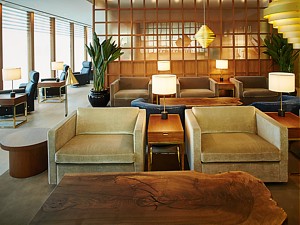 Cathay Pacific reopens London Heathrow lounges
Cathay Pacific reopens London Heathrow lounges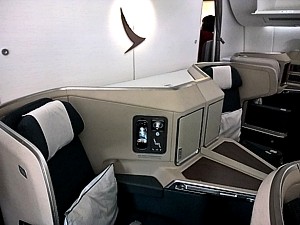 Trip Report: Cathay Pacific A350 Business Class Hong Kong to Bangkok
Trip Report: Cathay Pacific A350 Business Class Hong Kong to Bangkok 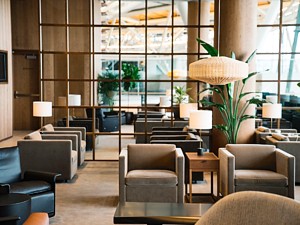 Cathay Pacific open Vancouver Lounge
Cathay Pacific open Vancouver Lounge 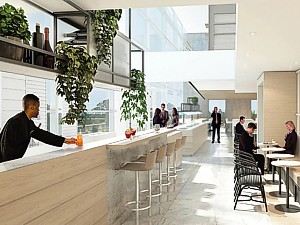 Qantas to improve lounges at Brisbane
Qantas to improve lounges at Brisbane